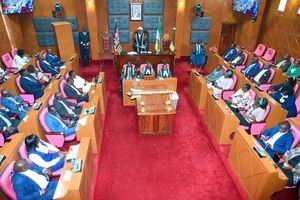
The National Assembly during a sitting.
The High Court shall have the final jurisdiction in determining appeals on the validity of the election of a Member of County Assembly (MCA) as Parliament moves to clear the doubts in the law.
The Elections (Amendment) Bill 2024 before Parliament, seeks to amend section 75 of the Elections Act to constrain appeals arising from the election of MCAs from dragging all the way to the Supreme Court.
“The determination of the appeal on the validity of the election of an MCA by the High Court shall be final,” reads the proposed new section in clause 29 of the Bill, a product of the National Dialogue Committee (Nadco) report.
The law currently provides that an appeal on the validity of election of MCA “shall lie to the High Court on matters of law only.”
The appeal, the law states, shall be filed within 30 days of the decision of the magistrate’s court and heard and determined within six months from the date of filing of the appeal.
Despite this provision, the appeals arising from the MCAs’ election petitions have ended at the Supreme Court, negating Article 87 (1) of the Constitution, which grants Parliament the mandate to establish mechanisms for timely settling of electoral disputes.
But even as the MPs moved to clear the doubts in the law on the MCAs’ election petitions, they avoided drawing clear lines to ensure that appeals on the validity of their own election ends at the Court of Appeal and not the Supreme Court.
Section 85A of the Elections Act states that an appeal from the High Court in an election petition concerning membership of the National Assembly, Senate or the office of county governor shall lie to the Court of Appeal “on matters of law only.”
Supreme Court
The law further adds that the petitions, just like the MCAs’, shall be filed within 30 days of the decisions of the High Court and heard and determined within six months of the filing of the appeal.
But just like the MCAs, appeals concerning the validity of election of MPs, senators and county governors have ended at the Supreme Court, the only court constitutionally mandated to hear and determine a presidential election petition.
Article 140 of the Constitution states that a presidential election petition is to be filed only at the Supreme Court within seven days after the date of the declaration of the results of the presidential election.
“Within 14 days after the filing of a presidential election petition, the Supreme Court shall hear and determine the petition and its decision shall be final,” the Constitution states.
Article 164 (3) of the Constitution grants the Court of Appeal the jurisdiction to hear appeals with section 85A of the Elections Act limiting the appeals to those emanating from the election of members of the National Assembly, Senate and county governors.
The MCAs’ will likely latch on Article 164 (3) of the Constitution to challenge the proposed law change given the supremacy of the Constitution in Article 2.
“Any law, including customary law, that is inconsistent with this Constitution is void to the extent of the inconsistency, and any act or omission in contravention of this constitution is invalid,” reads part 4 of Article 2 of the Constitution.
The opponents of the law change may also raise the question of discrimination- limiting the jurisdiction of the Court of Appeal to hear a second appeal in the election petition of an MCA.
There have also been arguments that such a law will contradict Article 27 (1) of the Constitution which states that every person is equal before the law and has the right to equal protection and equal benefits of the law.
Article 25 of the Constitution provides for the fundamental rights and freedoms that may not be limited and therefore are inalienable and non-derogable- the right to a fair trial, which may include the right to appeal the election of MCAs beyond the High Court.
Losing an election petition comes with consequences.
Election Act
Section 86 (1) of the Election Act provides that an election court shall, at the conclusion of the hearing of an election petition, determine the validity of any question raised in the petition and shall certify its determination to the Independent Electoral and Boundaries Commission (IEBC).
The electoral commission shall then notify the relevant Speaker — National Assembly, Senate or county assembly — who shall upon receipt, give the necessary directions for altering or confirming the return “and shall issue any notification which may be necessary.”
The election court shall also, at the conclusion of the hearing of a petition, “in addition to any other orders”, send to the Director of Public Prosecutions (DPP), the IEBC and the relevant Speaker a report in writing.
The report shall indicate whether an election offence has been committed by any person in connection with the election and the names and descriptions of the persons, if any, who have been proved at the hearing to have been guilty of an election offence.
“Before a person, not being a party to an election petition or a candidate on whose behalf the seat is claimed by an election petition, is reported by an election court, the elections court shall give that person an opportunity to be heard,” the law states.
This shall afford the person an opportunity to give and call evidence to show why he should not be reported.
At the end, the relevant Speaker shall publish the report made in the Gazette “and the IEBC shall consider the report and delete from the register of voters the name of a person who is disqualified from being registered in that register of voters.”
dmwere@ke.nationmedia.com






